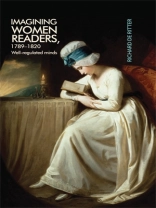Imagining women readers reassesses the cultural significance of women’s reading in the period 1789–1820. From the turbulent years following the French Revolution to the fiction of Jane Austen, this book charts the rise of a self-regulating reader, who possesses both moral and cultural authority. Rather than an unproductive leisure activity, for the writers discussed in this study the act of reading is crucial to imagining forms of female participation in national life. The book thus offers a unique perspective on the relationship between reading, education and the construction of femininity, shedding new light on the work of some of the most celebrated women writers of the period.
It will appeal to students and scholars interested in the history and representation of reading, and in women’s writing of this period more generally.
Зміст
Introduction
1. ‘Like a sheet of white paper’: books, bodies, and the sensuous materials of the mind
2. ‘Wholesome labour’: the work of reading
3. ‘The enlightened energy of parental affection’: post-revolutionary schemes of education
4. ‘Leisure to be wise’: female education and the possibilities of domesticity
5. Making the novel-readers of a country: pleasure and the practised reader
Bibliography
Index
Про автора
Richard De Ritter is Lecturer in the School of English at the University of Leeds











